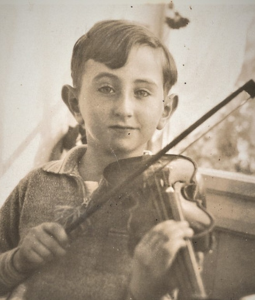

Born in 1923, Jack was subjected to antisemitic name-calling in school even before Hitler came to power. His mother hoped he would become a doctor like his father, but Jack’s schooling would become a series of interruptions.
Following his father’s death in 1932, Jack, his sister, and his mother moved to Trier, then Cologne, and finally to Berlin, each time moving to a larger city in an effort to remain anonymous, each time forced to attend Jewish schools. Jack’s mother remarried, and recognizing the bleak future, Jack’s step-father left for the U.S. in 1938 to arrange the family’s emigration. During Kristallnacht in Berlin, Jack was almost killed in the streets. His step-father did not return to Germany.
Two months before the war started, Jack’s sister left for England, taking a job in a children’s hospital. With school no longer an option for Jack, forced labor became his education. Jack and his mother made leather knapsacks for the German troops, paid only half the wage of non-Jewish Germans. In mid-1942, Joseph Goebbels, Reich Minister of Enlightenment and Propaganda, promised to make Berlin “Judenrein” (free of Jews) by Hitler’s April birthday. Jack and his mother were arrested in late 1942. Separated during deportation, he was sent by railroad cattle car to Auschwitz; his mother was sent to her death.
Because he was young and strong, Jack was selected for slave labor in five different camps: Auschwitz III (Buna or Monowitz), Auschwitz I, Dachau, Gross-Rosen, and Mühldorf. Each move was hastened by the approaching Russian forces. Jack worked building factories and sorting human hair to be used in the manufacture of mattresses. On May 8, 1945, Jack was liberated from Mühldorf by American troops. Now twenty-two, he weighed only sixty pounds.
After liberation, Jack searched for his family with no success and immigrated to New York in 1947. His family in Atlanta and a cousin working for the Jewish Telegraphic Agency in New York were instrumental in his immigration. Jack has said that he could not have lived in the South during that period because the Jim Crow Laws were constant reminders of the persecution he had endured. With the ability to speak German and some French, English, and Yiddish, Jack wasted no time finding work.
Jack met and married his wife, Phyllis, in New Jersey. In 1994, they moved to Adamsville to be near family and escape the cold northern winters.
Click on any image below to enlarge and view captions.
All photos on this website are the property of the Alabama Holocaust Education Center archive. Please contact us for permission before using or sharing any images.
09/30/1923
Bernkastel
Irma Bodenheimer (Spouse #2: Schindler; Spouse #3: Rehfield)
Dr. Manfred Bassfreund
Ilse Bassfreund
(Born 1921)
Harriet Boxer
Married 1950-1976
2 children: Irma, Susan
Vivian Ryan
Married 1979-1986
Phyllis Sherman (1923-2016)
Married 1993-2010
Irma Bass (Spouse: Kenneth Carrano)
(Born 1954)
Susan Bass (Spouse: Thomas Whalin)
(Born 1957)
1994-2010
Auschwitz III (Buna)
(circa 03/03/1943)
Tattoo #106377 ∇
Auschwitz I
(06/01/1943)
Gross-Rosen
(01/1945)
Dachau
(01/28/1945)
Mühldorf (subcamp of Dachau)
(02/1945)
01/18/1945: Auschwitz to Pless to Loslau to Gross-Rosen to Regensburg to Dachau (arrived 01/28/1945)
US Army / May 2, 1945 / Mühldorf (subcamp of Dachau)
Jack was arrested in Berlin on February 27, 1943 during the Großaktion Juden
Funk Caserne, Berlin
1947: Joined US National Guard
1994-2010
David P. Boder interviews Jürgen Bassfreund (Jack Bass) | September 20, 1946
Audio Recording in German | English Transcription
USC Shoah Foundation
Interview #30765
(2:52:02)
July 9, 1997 | Adamsville, AL
USHMM Oral History
Accession Number: 2003.255
(1:05)
October 17, 2003
Alabama Holocaust Education Center
“Children of the Holocaust” (2008)
(4:25)
2008, Autobiography (unpublished)
Available in AHEC Library
AHEC Darkness into Life Exhibit (2007)